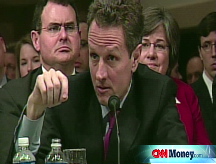These banks don't need your help
Bank stocks have plunged this year despite all the federal aid they've received. But a small group of banks have bucked the downward trend.
NEW YORK (CNNMoney.com) -- Bank may be the dirtiest of four-letter words these days. A close second is the acronym TARP.
Several top banks have taken billions of dollars in government aid from the Troubled Asset Recovery Program during the past few months but there has been little evidence that they have used the funds to boost lending to consumers and businesses.
Lawmakers and taxpayers are rightfully outraged about how little has seemed to change in the banking business. Even though financial firms are now beholden to you and me, many are still spending heavily on outlandish bonuses and seemingly frivolous things like stadium naming rights deals.
That's why Treasury Secretary unveiled a new initiative Tuesday called the Financial Stability Plan (RIP TARP!) to try and get banks to start lending again.
It's also why the CEOs of the eight banks that took part in the first round of TARP, including the heads of Citigroup (C, Fortune 500), Bank of America (BAC, Fortune 500), JPMorgan Chase (JPM, Fortune 500) and Wells Fargo (WFC, Fortune 500), are set to appear before the House Financial Services Committee Wednesday to explain how they've used government funds.
But not all banks deserve our scorn. In fact, there's a handful of banks that amazingly are trading at higher stock prices now than they were six months ago, just before Lehman Brothers blew up.
Take a look at TFS Financial (TFSL), a savings and loan in Cleveland with $10.9 billion in assets. Despite the fact that the company is headquartered in a city that has been hit hard by rising foreclosures, the bank has continued to perform well.
Shares are up 11% in the past six months. While some banks have reported a decrease in assets due to reduced lending activity, TFS said that assets rose slightly in its most recent quarter due to an increase in mortgage loans. The company raised its dividend by 40% in January.
And here's what will probably be of most interest to readers: TFS has not asked for any funding from the much-maligned Troubled Asset Relief Program, or TARP.
Chairman and CEO Marc A. Stefanski said in a statement in late October that "we've got money for mortgages" and that he didn't think "our customers want us to use their taxpayer money to run our business. We should be able to generate our own funds."
Stefanski added in the bank's annual report that it would be "inappropriate" to apply for TARP funds.
TFS is not the only bank to have scorned government funding...and win the hearts of investors as well as taxpayers.
People's United Financial (PBCT), a bank based in Bridgeport, Ct. with $20 billion in assets, has also spurned TARP. And with good reason, the bank reported that net charge-offs as a percentage of loans in 2008 was unchanged from 2007, despite the recession. And the ratio is a ridiculously low 0.1%
"Our disciplined underwriting standards have resulted in consistent asset quality results," noted People's United Financial CFO Paul D. Burner in the bank's latest earnings report. That's an understatement.
A spokesman for the bank added that the bank has about $2.5 billion in excess capital and that the bank never made subprime mortgage loans or alt-A loans.
Not surprisingly, the stock has held up much better than its banking brethren, rising 3% in the past six months compared to a more than 50% drop in the KBW Bank Index.
Shares of Capitol Federal Financial, a Topeka, KS.-based bank and fellow TARP avoider, are also up 3% in the past six months. The bank, with about $8.2 billion in assets, is a rarity in the sector: its earnings are actually expected to increase this fiscal year.
And like People's United, Capitol Federal Financial (CFFN) has largely steered clear of the subprime mortgage mess. The bank reported that non-performing loans as a percentage of total loans was just 0.35% at the end of December.
So there you have it. Some banks acted responsibly during the housing boom and didn't need to go running to the government for help. They've been rewarded for doing so. And rightfully so. Too bad they're part of a small club. ![]()




